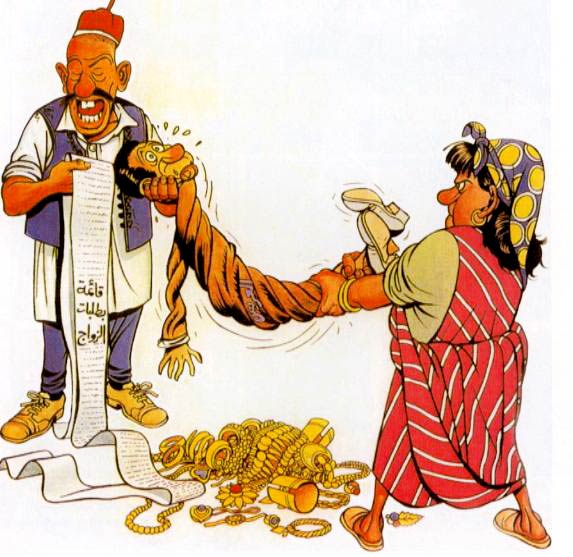'The Dowry'.
Mohamed Al-Zawawi was a pioneer of Libyan cartoons, whose comical observations of everyday life have appeared in magazines and newspapers like at-Tawra and Al Amal. The artist has received much acclaim in the Arab world, and is considered the father of Libyan cartoons, comics and animation. He is also referred to as Mohamed Zwawi or Muhammad az-Zuwawi.
Early life and career
Mohamed Al-Zawawi (محمدالزواوی) was born in 1936 in the suburbs of Benghazi , Libya. He began working as a graphic artist in 1961, after abandoning his studies for personal reasons. He spent the first years of his career in the audiovisual department of "The Fourth American Station", and later moved on to work with the Libyan Ministry of News and Guidance. In 1963, Al-Zawawi became editor and cartoonist for the broadcasting magazine Al-Idha'a in Tripoli, in which he published his first cartoons. Afterwards, he worked for many other journals and newspapers, most notably the newspaper at-Tawra and the weekly magazine Al-Usboo' Assiaasi.
Comic strip published in the Libyan broadcasting magazine Al-Idha'a in November 1964.
Al Amal
In 1974, Al-Zawawi worked as an artist supervisor on the initial setup of the children's magazine Al Amal (The Hope). He designed the main characters in the magazine, which were later drawn by other artists. He also contributed some short stories and covers, as well as two long series. The first, 'The Young Hero', dealt with the war against the Italian colonists. The second serial, 'With one blow I killed seven', was based on popular heritage (presumably a version of 'The Brave Little Tailor').
Comic strip by Mohamed Al-Zawawi.
Style
Al-Zuwawi has compiled two collections of his work, 'Al-Wajh Al-Ahir' ('The Other Side of the Medal', covering the period 1966-1972) and 'Antum!!! Intima 'iyat Siyasiyat' ('Cartoons about Politics and Society', 1973-1996). His cartoons usually present observations on Libyan society, culture and everyday life in a comical way, with a strong emphasis on the common man. Even though his work can be considered anti-establishment, his cartoons still appeared in the newspapers censored by Colonel Gaddafi's regime. Some directly address the danger of producing art in Libya, while others criticize the United Nations, the role of oil in world politics and the "Westernization" of youth culture in his country.
Recognition and influence
For his groundbreaking work, Al-Zawawi received praise in both his home country and abroad. In Europe, his work is especially appreciated in Italy, where it was featured in the exhibition 'Matite Africane'.
Animation career
Al-Zawawi was also a pioneer in the local animation industry. In the early 1980s, he was asked by the national Libyan TV to make a series of animated cartoons. One of these was 'Hajj Nakad', on which he worked in cooperation with a studio in the UK, and another was the 45-minutes film 'Joha's Diary', which was largely produced in Japan. Like his comics, his animation projects also critically tackled Libyan society.
Death
Mohammed Al-Zawawi died on Sunday 5 June 2011 in the Libyan capital Tripoli. The funeral service was attended by several Libyan intellectuals, media practitioners, writers and artists. His satirical work was an inspiration for many cartoonists from the Arab world. Several young caricaturists were trained in his art school, which he founded in Tripoli.







